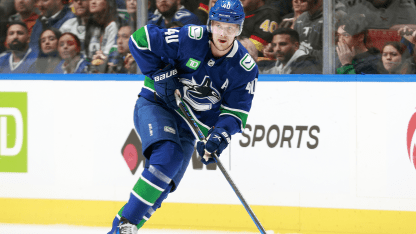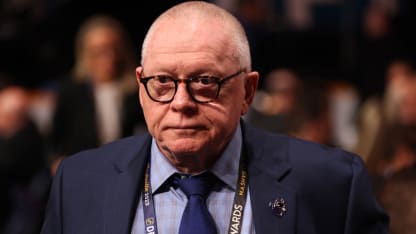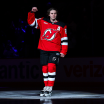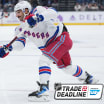VANCOUVER -- Elias Pettersson reiterated Friday that he prefers to wait until after the season to sign a contract with the Vancouver Canucks.
The forward’s comments came after Jim Rutherford signed a three-year contract to remain Vancouver’s president of hockey operations earlier in the day and spoke of the Canucks’ desire to sign the pending restricted free agent to a new deal.
“Wait until end of the year,” Pettersson said.
The 25-year-old, who is in the final season of a three-year, $22.05 million contract ($7.35 million average annual value) he signed Oct. 3, 2021, said before this season that he preferred to wait until it was over before signing a new contract, admitting he wasn’t sure if he wanted to commit to a short- or long-term deal.
At the time, the Canucks were coming off a sixth-place finish in the Pacific Division (38-37-7) and had missed the Stanley Cup Playoffs for a third straight season.
This season, Vancouver (30-11-4) leads the NHL with 45 points entering its home game against the Toronto Maple Leafs on Saturday (7 p.m. ET; SN), and Pettersson is a big reason for that; he’s tied with William Nylander of the Maple Leafs and Connor McDavid of the Edmonton Oilers for sixth in the NHL in points (59; 24 goals, 35 assists) and has a plus-19 rating in 45 games.
The Canucks have a plus-55 goal differential and are in position to make the playoffs for the second time in Pettersson’s six NHL seasons.
Asked Friday if he’s happy with how things have improved since Rutherford took over, Pettersson said, "Yeah, of course. I think it shows for itself, where we are in standings, all the renovations at the rink and just to become a really professional hockey club, and the culture has changed.”
Selected by Vancouver with the No. 5 pick in the 2017 NHL Draft, Pettersson is averaging more than a point per game for his NHL career, with 382 points (160 goals, 222 assists) in 370 games, and had 18 points (seven goals, 11 assists) in 17 playoff games in 2020.
But Rutherford isn’t worried about the lack of a new contract.
“There's not anybody getting anxious here,” Rutherford said. “Come the offseason, then things will get a lot more serious if in fact the situation gets to that point.”
With Rutherford discussing his own contract, it didn’t take long for him to be asked about Pettersson. But it wasn’t the first time he was asked about that subject Friday.
“My son asked me at 7 o'clock this morning, just for the record, because he asks me almost every morning, just like everybody else wants to know,” Rutherford said. “Look, we can wait. I'll say the obvious, we keep saying it over and over: We really want him to stay. He's a very special player. He's very important to the Canucks, he's very important to the city and he can't walk at the end of the season, and that's the position that we've taken. We've taken it very comfortably.”
In the meantime, Vancouver has to decide whether to try to improve the team ahead of the 2024 NHL Trade Deadline on March 8, and what to do with struggling forward Andrei Kuzmenko, who scored 39 goals in 81 games last season, his first in the NHL, but has eight in 39 games this season and has been scratched five times.
“I don't know what we do more than what the coaching staff has been doing,” Rutherford said. “He's lost his confidence. He's a good player, and he can score and there's no doubt in my mind, whether it's in Vancouver or another NHL city, he will score but it's tough. When you have confidence, everything just feels good, and it goes right like it did last year for him. And when you lose your confidence and you start pressing, then it's hard and I just believe that's where he's at now.”
As for possibly improving the team ahead of the deadline, Rutherford said the players and coaches “deserve the best opportunity they can to compete going forward” but knows there’s risk involved.
“You can make the right changes and it could still not work,” said Rutherford, who is a three-time Stanley Cup winner: once as president and general manager of the Carolina Hurricanes (2006) and twice as GM of the Pittsburgh Penguins (2016, 2017). “So, there's a risk in it but there's also a risk in not trying to improve the team when you get to a certain level, and I've seen that with teams where I say, 'Wow, that team's pretty good,' and then they don't do anything. So, that's what we talk about. We've been talking about that for a month now within our hockey operations, trying to decide what we want to do.”



















